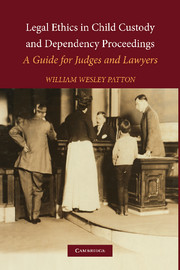Book contents
- Frontmatter
- Contents
- Foreword, by Martin Guggenheim
- Acknowledgments
- Introduction
- 1 Conflicts of Interest
- 2 Competent and Zealous Representation
- 3 Confidentiality
- 4 The Ethics of Alternative Dispute Resolution in Child Custody and Dependency Proceedings
- 5 Ethical Considerations and Constraints in Child Custody and Dependency Appeals
- 6 The Constitutionality of Legislative and Executive Regulation of the Practice of Law and Defining the Attorney-Client Relationship
- Appendix A National Association of Counsel for Children Standards
- Appendix B American Bar Association Standards of Practice for Lawyers Who Represent Children in Abuse and Neglect Cases
- Appendix C In re Car Simulation and Analysis
- Other Authorities
- Cases and Ethics Opinions
- Index
Foreword, by Martin Guggenheim
Published online by Cambridge University Press: 24 July 2009
- Frontmatter
- Contents
- Foreword, by Martin Guggenheim
- Acknowledgments
- Introduction
- 1 Conflicts of Interest
- 2 Competent and Zealous Representation
- 3 Confidentiality
- 4 The Ethics of Alternative Dispute Resolution in Child Custody and Dependency Proceedings
- 5 Ethical Considerations and Constraints in Child Custody and Dependency Appeals
- 6 The Constitutionality of Legislative and Executive Regulation of the Practice of Law and Defining the Attorney-Client Relationship
- Appendix A National Association of Counsel for Children Standards
- Appendix B American Bar Association Standards of Practice for Lawyers Who Represent Children in Abuse and Neglect Cases
- Appendix C In re Car Simulation and Analysis
- Other Authorities
- Cases and Ethics Opinions
- Index
Summary
The United States spends considerable efforts trying to prove to itself and the world that it is as child-friendly and child-centered as the next country. But this is a difficult challenge for a country that remains alone in the world in its refusal to sign the United Nations Convention on the Rights of the Child, and it remains in the company of many significantly poorer nations in its refusal to guarantee a minimum degree of public support or health benefits for children. Even worse, for those who insist on ranking the United States as a nation devoted to the well-being of children, children comprise the largest group of extremely poor Americans. Worse still, the percentage of the population of children who are poor has grown considerably larger over the past generation, even as the United States has all but eliminated extreme poverty for the elderly.
According to the KIDS COUNT Data Book, published annually by the Annie E. Casey Foundation, there were more than 13 million children living in poverty in the United States in 2003, an increase of more than 500,000 since 2000. More than 4 million children currently live in households where no parent has worked within the past year. The Children's Defense Fund reports that more than 9 million children, more than 12 percent of all of America's children, go without any kind of health insurance.
- Type
- Chapter
- Information
- Legal Ethics in Child Custody and Dependency ProceedingsA Guide for Judges and Lawyers, pp. ix - xPublisher: Cambridge University PressPrint publication year: 2006

